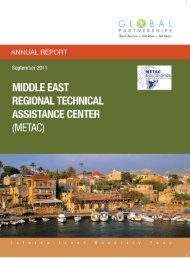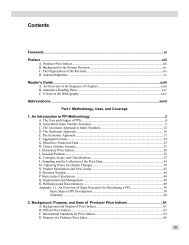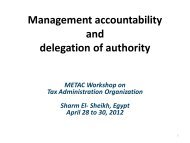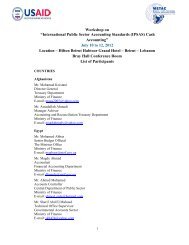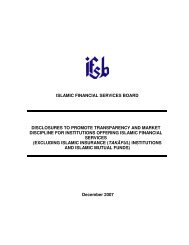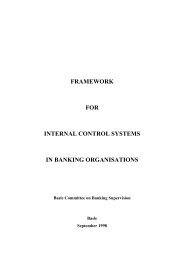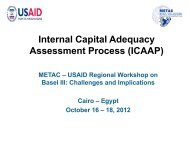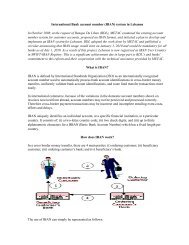Result Based Management Framework - METAC
Result Based Management Framework - METAC
Result Based Management Framework - METAC
Create successful ePaper yourself
Turn your PDF publications into a flip-book with our unique Google optimized e-Paper software.
9<br />
<strong>METAC</strong>’s overall strategic objective is to improve the conduct of macroeconomic<br />
policy through institutional and capacity building. In the remaining period of Phase<br />
III, the program will focus on four areas with the following objectives: (i) achieving a<br />
more risk-oriented banking supervisory and a regulatory framework that enhances<br />
financial stability; (ii) establishing an integrated public financial management (PFM)<br />
framework that effectively links policies to public resource allocation and improves<br />
transparency in, and accountability for, managing public finances; (iii) upgrading revenue<br />
administration to bring it closer to best international standards to improve revenue<br />
performance; and (iv) bringing member countries closer to compliance with international<br />
standards for the compilation of external statistics, national accounts (NA), and price<br />
statistics.<br />
During Phase III, in addition to the four areas currently covered by <strong>METAC</strong>, until<br />
October 2012, <strong>METAC</strong> provided TA and training in the area of improving debt<br />
management and developing money markets for efficient financing of governments’<br />
needs and for better conduct of monetary policy. However, due mainly to relatively low<br />
demand and <strong>METAC</strong>’s tight financial condition during the first three years (May 2010-<br />
April 2013) of Phase III, a decision was made to discontinue the work in this area. The<br />
work that was done by <strong>METAC</strong> in this area in member countries is summarized in<br />
Appendix I.<br />
<strong>METAC</strong> will continue to be engaged with all member countries but to varying<br />
degrees and TA will be tailored to countries’ specific needs. TA needs in countries that<br />
have experienced uprisings and in fragile states will be substantial. This is the case of<br />
Egypt, Libya, Sudan, Syria, West Bank and Gaza, and Yemen, and to a lesser extent<br />
Afghanistan. TA in these countries will be directed mainly to building institutions capable<br />
of conducting macroeconomic policy to achieve sustained growth while protecting social<br />
sectors and reducing poverty. However, in case <strong>METAC</strong>’s involvement in some of these<br />
countries continues to be hampered by the security situation and political turmoil,<br />
resources will be shifted to the relatively more stable countries.<br />
Regional workshops will continue to provide hands-on training and a platform for<br />
sharing knowledge and exchanging experiences. Training will be focused on those<br />
areas identified in need of improvement in TA reports, to exploit the synergies between<br />
TA and training and to respond to country priorities. In this context, <strong>METAC</strong> will<br />
continue to enhance its partnership with donors and other TA providers to increase the<br />
efficiency and effectiveness of its capacity-building activities.<br />
This document is organized as follows. For each country, we reviewed briefly the work<br />
that has been done until July 2013 and then outlined in some details the objectives in each<br />
of the four areas that <strong>METAC</strong> is focusing on: banking supervision, macroeconomic<br />
statistics, public financial management, and revenue administration. For each area, we<br />
specified the objectives to be met along with outcomes, expected outputs, and the





